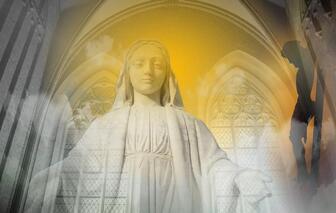
By M.P. Pellicer | Stranger Than Fiction Stories
Over a hundred years ago on April 1, 1922, all the newspapers carried the news of the death of Josefa and Rosa Blazek conjoined Siamese twins who died two days before in Chicago.  Blazek twins as babies with their mother Blazek twins as babies with their mother
The doctor treating them said "the death of one sister would result in the immediate death of the other," unless they were separated. Their brother, Frank Blazek refused to permit an operation to separate their bodies. According to Illinois law he was the only adult relative capable of giving consent for the procedure.
Many claimed Frank Blazek was a gold digger who appeared on the scene when his sisters were on death's door, and he hoped to inherit some of their money. They had been in the hospital for 10 days, because Josefa was ill with jaundice. She took a turn for the worse on March 29, when she developed pneumonia in the right lung. Her temperature soared, and then Rosa took a "sympathetic" turn for the worse, since she was suffering already from bronchitis. However their story started many years before.  Chang and Eng Bunker were the originators of the word "Siamese" twins Chang and Eng Bunker were the originators of the word "Siamese" twins
The origins of the word "Siamese" was used when two boys born conjoined in 1811, near Bangkok named Chang-Eng were bought by a sea captain to New York in order to exhibit them. With the money they made they bought property in North Carolina, each owning his own farm. They called themselves Chang and Eng Bunker. In 1843, they married two sisters, and alternated between the two homes who were a mile apart. Chang had 10 children and Eng 11. They died in 1874.
The Blazek girls were pygopagus twins born in Skerchov, Bohemia (modern-day Czech Republic) on January 20, 1878, to normal parents. Four other children were born to the couple without any abnormalities. They each had separate respiratory and cardiac systems but only one set of secondary digestive and procreative organs. When the women were on their deathbed, another doctor opined that there would have been no hope of saving Rosa's life even if they were separated. They were joined back to back, but with sufficient "power of movement to turn towards each other." Rosa was considered more intelligent, and physically more dominant. Josefa was slightly more deformed with her left leg being shorter than her right.  Josefa and Rosa Blazek with Frantz the son born to them (later disputed, and thought to be have been adopted) Josefa and Rosa Blazek with Frantz the son born to them (later disputed, and thought to be have been adopted)
The twins started to exhibit professionally in Paris. Until then, they had only gone to local fairs. They found a manager, and learned to play the xylophone and sing as a way to draw in crowds. They toured Europe during the 1890s, and later became adept at the violin. They would entertain their audience with duets.
Despite their appearance they were sexualized in matters of promotion, and of course this drove conjecture on their sexual appetite and how they managed considering their unusual physique. When Rosa was 32, she fell in love, and supposedly married a captain in the German army in 1906. He was killed in action in 1917. Josefa never married. At the turn of the century their popularity waned due to poor management, however in 1909 when Rosa claimed to be pregnant, their names once more made front page news. Rosa's child was born on April 16, 1910. He joined the show as he grew older, as "The Son of Two Mothers".  Josefa and Rosa Blazek with Frantz the son born to them (later disputed, and thought to be have been adopted) Josefa and Rosa Blazek with Frantz the son born to them (later disputed, and thought to be have been adopted)
This titillated the imagination of the public as to how the child was conceived. Originally Rosa refused to name the father of the baby, even though at this time she was married to the German captain with a surname of Dvorak. Some said their manager was the father, and that he paid them 95,000 marks for three years to keep them quiet.
By then Rosa and Josefa had made a fortune by appearing at exhibitions around the world. They moved to Chicago in 1920, hoping to break into vaudeville. After their death, it was found that they shared one backbone and any attempt to separate the bodies would have resulted in their immediate demise. A radiologist who examined x-rays suspected the real cause of their death was an intestinal obstruction. Before the month was out, George C. Warner, president of the National Spiritualists' Association announced that death had separated the twins  Blazek Twins advertisement of appearance Blazek Twins advertisement of appearance
During the debate of settling the twin's estate there was a question if either of them could have borne a child. This was spurred by Franzi Blazek's claim on his mother's estate. The doctors that examined the x-ray taken of the twins after their death, claimed that there were anatomical reasons for doubting they could have conceived a child. The two women shared the same vagina and anus, but had two separate uterine tracts, however there was no evidence that either one had ever become a mother.
Two weeks after their death the twins were cremated and the comingled ashes were given in an urn to their brother who returned to Czechoslovakia. Most of the controversy as to who would inherit the bulk of their estate, which was estimated to be about $200,000, especially if Franz was Rosa's natural born son versus adopted, quieted when by May it was established they only left $400. One man remembered that they were "like two Mae Wests, joined at the tail bone. One would wiggle, while the other would waggle, and brother could they put on a great show." 1922 was not a good year for carnival folk. Six months after their death Clarence Wortham who was said to be the largest individual owner of carnival shows in the country, died at the age of 40 from an attack of appendicitis. He owned nine circuses and was the one who brought the Blazek twins to America.
0 Comments
Your comment will be posted after it is approved.
Leave a Reply. |
Stranger Than Fiction StoriesM.P. PellicerAuthor, Narrator and Producer Archives
July 2024
Categories
All
|
Stories of the Supernatural
- Stories of the Supernatural
- Miami Ghost Chronicles
- M.P. Pellicer | Author
- Stranger Than Fiction Stories
- Eerie News
- Supernatural Storytime
-
Astrology Today
- Tarot
- Horoscope
- Zodiac
-
Haunted Places
- Animal Hauntings
- Belleview Biltmore Hotel
- Bobby Mackey's Honky Tonk
- Brookdale Lodge
- Chacachacare Island
- Coral Castle
- Drayton Hall Plantation
- Jonathan Dickinson State Park
- Kreischer Mansion
- Miami Biltmore Hotel
- Miami Forgotten Properties
- Myrtles Plantation
- Pinewood Cemetery
- Rolling Hills Asylum
- St. Ann's Retreat
- Stranahan Cromartie House
- The Devil Tree
- Trans-Allegheny Lunatic Asylum
- West Virginia Penitentiary
- Paranormal Podcasts
"When misguided public opinion honors what is despicable and despises what is honorable, punishes virtue and rewards vice, encourages what is harmful and discourages what is useful, applauds falsehood and smothers truth under indifference or insult, a nation turns its back on progress and can be restored only by the terrible lessons of catastrophe."
- Frederic Bastiat
- Frederic Bastiat

Copyright © 2009-2024 Eleventh Hour LLC. All Rights Reserved ®
DISCLAIMER
DISCLAIMER


 RSS Feed
RSS Feed
















